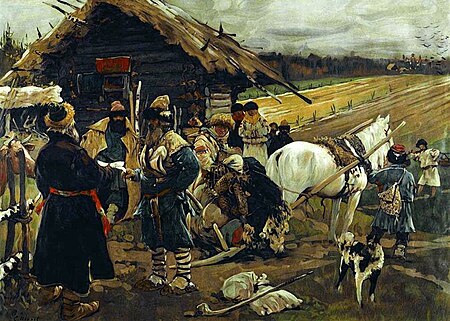It happened today - March 3, 2016
 It is a paradox of history that Russia legally freed its most oppressed people before the United States did. And that it didn’t really work in either place.
It is a paradox of history that Russia legally freed its most oppressed people before the United States did. And that it didn’t really work in either place.
Formally American slaves were freed on December 6, 1865, when the 13th Amendment to the U.S. Constitution was ratified by Georgia. But Russian serfs got their liberty, after a fashion, on March 3 1861 when Tsar Aleksandr II said let it be so. Except the serfs were owned by the government, who had to wait another five years just because.
In practice, of course, black Americans were denied full legal and social equality for a century afterward, especially in the South. And Russian serfs weren’t even as free as the rest of the populace that wasn’t free anyway.
You might be tempted to point to the Russian result as an argument in favour of autocracy or even tyranny. The tsar could do anything he wanted, and lawmaking was a bureaucratic rather than a democratic enterprise. So it didn’t matter a rouble what anyone else thought about emancipation. Once he decided on it, it happened.
In the U.S. you had to get things past “the people” even in the perverse situation where some of the people, which in some states was a minority, were preventing others from taking part in the discussion. White bigotry, in the north as well as the south, meant civil rights for blacks had to wait for a change of heart.
Not in Russia. Except not so fast.
For one thing, the tsar could say just about anything. But it wouldn’t necessarily happen. In a vast country with lousy communications, even if word arrived from Moscow or St. Petersburg it might be misunderstood or ignored. Or worse, it might be seen clearly to be flawed but there was nothing you could do.
Emancipation was like that. The “reform” was carried out in a way that left the peasants impoverished, helpless and resentful, and the nobility impoverished, helpless and resentful. In a speech to “the Marshalls of the Nobility” in March 1856, in reaction to the shock of defeat in the Crimean War, the tsar said “My intention is to abolish serfdom ... you can yourself understand that the present order of owning souls cannot remain unchanged. It is better to abolish serfdom from above, than to wait for that time when it starts to abolish itself from below.” But these wise words were impossible to implement in a system that lacked popular input, let alone popular sovereignty, and Russia experienced virtually constant turmoil or fear of turmoil until 1917 when the Russian Revolution fastened a new and even more dreadful form of serfdom on everyone from the humblest muzhik to members of the Politburo.
There’s an important distinction between rule of law, that is, fair rules derived from the people and applicable to everyone, and rule by law, where everything is done by reasonably detailed and accurate bureaucratic methods including writing down the rules, but the rules can say just anything and change at any moment. (I do not know who first stated the issue in these terms; if anyone does please let me know because I think it’s a very important insight.) But Russia didn’t even get to the latter category.
Lawmaking wasn’t merely arbitrary, it was so haphazard that serfdom itself arose without discernible legal foundation. It was imposed by Boris Godunov in the very late 16th century, to the extent that it did not merely put the official seal on existing oppression. But it wasn’t put into the law code until Tsar Alexis more than half a century later, in 1649. And in assembling that law code the tsar actually had to get bureaucrats to scour the country and correspond with various local notables to try to discover what edicts tsars had actually flung in various directions, many lapsed, ignored or contradictory.
The result of the American process is impossible to love either in this case. Even sound institutions are no match for hatred in the human heart at least in the short run. But by channeling discussion into mostly lawful channels, exposing institutions to free inquiry and demanding justifications, emphasizing the dignity of the individual and creating space for civil society, they lay the foundation for a gradual softening of ancient hatreds.
Thus it is that the United States has a black president, and Russia is ruled by a tyrannical, weird autocrat whose whim is highly ineffective law in a highly dysfunctional government, economy and society. Even though formal liberation for the most oppressed came sooner there.